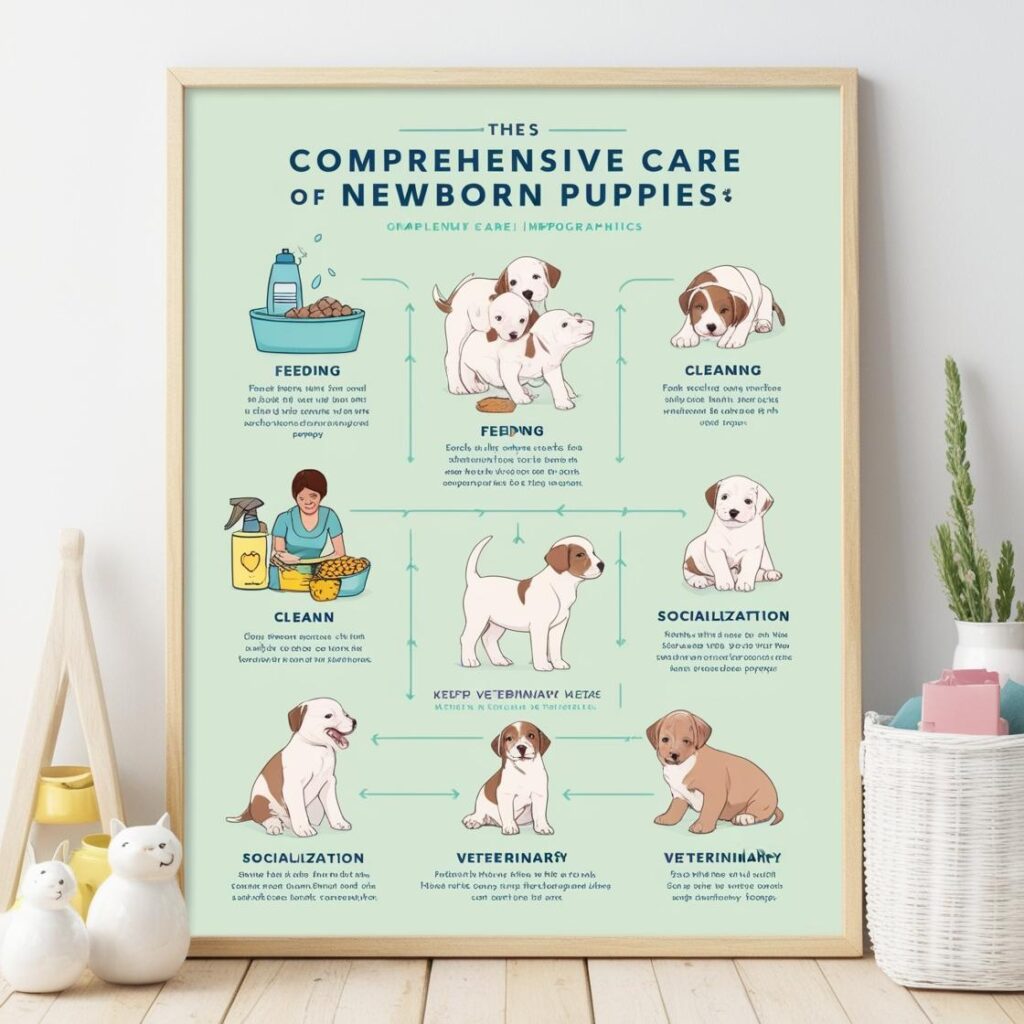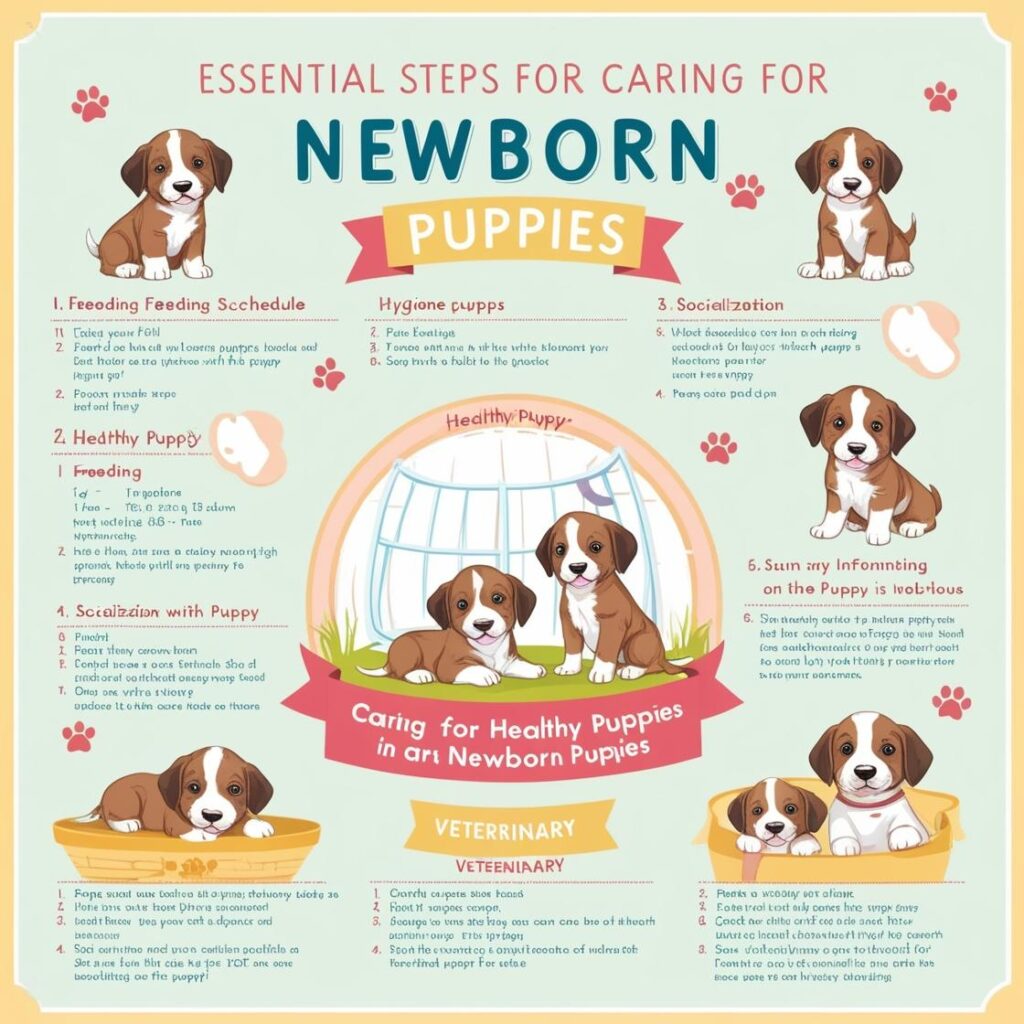Welcoming a litter of newborn puppies into your home is an incredibly rewarding experience. However, it also comes with significant responsibilities. Newborn puppies are delicate and require meticulous care to ensure they thrive and develop into healthy, happy adult dogs. This guide will walk you through everything you need to know about taking care of newborn puppies, from their basic needs to health considerations and socialization.
Understanding Newborn Puppies
Newborn puppies are entirely dependent on their mothers for warmth, nutrition, and care during the first few weeks of life. They typically enter the world blind, deaf, and unable to regulate their body temperature, making them highly vulnerable. Most puppies will spend the first two to three weeks of life nursing and sleeping. Knowing these basics will help you understand what they need during this critical period.
Essential Care for Newborn Puppies

Nutritional Needs
- Nursing: If the mother is present and capable, the best source of nutrition for newborn puppies is their mother’s milk. It contains essential nutrients and antibodies that help protect against infections.
- Supplementing with Puppy Formula: If the mother is unable to nurse or if the puppies are orphaned, you will need to use a high-quality puppy milk replacer. Veterinarians typically recommend products like Esbilac or KMR, which are specifically formulated for puppies.
- Feeding Schedule: Newborn puppies require feeding every 2 to 3 hours, gradually transitioning to less frequent feedings as they grow. Each puppy should consume approximately 10-20% of its body weight in formula daily.
Keeping Warm
Newborn puppies cannot regulate their body temperature and are at risk of hypothermia. To ensure they stay warm:
- Hydration: Keep them in a warm environment (75-80°F initially) using heating pads or warm water bottles wrapped in towels. Ensure that there are cooler areas available if the puppies need to move away from the heat.
- Bedding: Provide a comfortable, insulated area for the puppies to rest. A box with soft blankets and towels will help them feel secure.
Hygiene and Care
- Whelping Box: A clean whelping box is essential. Regularly change the bedding to keep the area free from bacteria and odors.
- Cleaning Puppies: Although mothers usually clean their puppies, you may need to assist. Use a soft, damp cloth to clean the puppies gently, especially if they are unable to nurse due to a dirty coat.
Health Monitoring
Regular health checks are vital in the early weeks of a puppy’s life. Watch for the following signs:
- Weight Gain: Weigh the puppies daily to ensure they are gaining weight consistently. A healthy puppy typically gains about 5-10% of its body weight daily.
- Physical Condition: Observe for any signs of illness, such as lethargy, refusal to nurse, or abnormal behavior. Consult a veterinarian immediately if any concerning symptoms arise.
- Eyes and Ears: Newborn puppies’ eyes and ears will begin to open between 10-14 days. Monitor for any signs of infection or abnormalities.
Initial Veterinary Care
It’s essential to have a veterinarian examine the puppies within the first few weeks of life. The vet will provide vital vaccinations and deworming protocols. Discuss a vaccination schedule, as the first set of vaccinations typically occurs at around six to eight weeks of age.
Socialization and Development
Socialization is crucial for the development of well-adjusted adult dogs. Although puppies are still very young, you can begin to take steps toward positive social experiences:
- Handling: Gently handle the puppies regularly to get them accustomed to human touch. This should include gentle petting, picking them up, and introducing them to varying textures.
- Introducing Sounds and Smells: Gradually expose them to various environmental noises (like vacuum cleaners or doorbells) and scents to help desensitize them.
- Interacting with the Mother: If the mother dog is present, allow her to interact with her puppies. This teaches the puppies essential social skills and boundaries.
The Next Steps: Raising Puppies Beyond Newborn Stage
As the puppies grow and develop, their care needs will change:
- Transition to Solid Food: Around 4 weeks, start introducing solid food, beginning with a wet puppy food mixed with warm water or puppy formula.
- Increase Socialization: As they reach the 6-8 week age, more deliberate introductions to other pets, people, and diverse environments will be beneficial.
- Training: Begin basic training techniques, establishing a routine for potty training, and rudimentary commands as the puppies grow.
- Veterinary Checkups: Routine veterinary visits will become increasingly important as the puppies age.
Conclusion
Caring for newborn puppies is a profound yet demanding task that requires dedication and attention. From ensuring they are well-fed and warm to providing essential socialization and health monitoring, every step plays a crucial role in shaping their future. If you find yourself overwhelmed, don’t hesitate to seek the guidance of an experienced veterinarian or puppy breeder. Remember that your efforts in these formative weeks will set the foundation for happy, healthy adult dogs. Embrace the journey, and enjoy the joy that these tiny creatures bring into your life.
